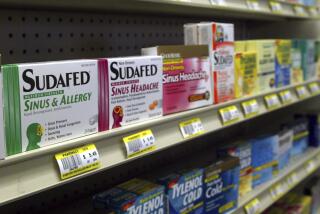FDA Seeks Ban on Laxative Ingredient
- Share via
WASHINGTON — The Food and Drug Administration is proposing a ban on over-the-counter products containing phenolphthalein, a principal component in most varieties of Ex-Lax and numerous other laxative products, because, it said, the compound poses “a potential cancer risk to people who use this ingredient at higher than recommended doses or for extended periods of time.”
Immediately after the FDA publicized its intentions Friday, Novartis, the Swiss-based pharmaceutical conglomerate that markets Ex-Lax, announced that the company was “immediately stopping manufacturing and shipping of all phenolphthalein-based products” and “voluntarily withdrawing” them from retail establishments.
Ex-Lax is among the three best-selling brands, accounting for about 7% of brand-name sales in the U.S. laxative market, which is estimated at $800 million a year. Last year, a Novartis spokesman said, Ex-Lax sales totaled $41 million. Neither of the other two top-selling products, Metamucil and Phillips Milk of Magnesia, contains phenolphthalein.
“Based on all available data, including nearly 100 years of human use, we continue to believe that phenolphthalein products are safe and effective when used as labeled,” the Novartis statement said, noting that “no incidence of cancer has ever been linked to phenolphthalein use in humans.”
The FDA agreed that there have been no reports of human cancer. And Robert Temple, associate director for medical policy of FDA’s drug center, cautioned that people who use Ex-Lax or other products containing the ingredient have no cause to panic.
About 15% to 20% of Americans use laxatives at one time or another, FDA officials said. No one should take any laxative on a daily basis, especially one containing phenolphthalein, which can cause complications including cramps and diarrhea in high concentrations, officials said.
The agency’s proposed ban, notice of which will be published Tuesday in the Federal Register, follows the recent release of studies indicating that rodents fed high amounts of the popular ingredient--between 30 and 100 times the recommended human dose--developed various kinds of tumors and, in some cases, genetic damage.
Those studies are the culmination of more than 20 years of FDA consideration of five “stimulant laxative” agents; that is, those that stimulate the large intestine to contract, facilitating evacuation of the bowel.
In a statement issued Friday, the agency explained that “because consumers have access to more than two dozen laxative products without this ingredient, FDA believes that phenolphthalein’s benefits do not outweigh its risk.” The proposed ban would reclassify the compound in the agency’s Category II, which contains ingredients not generally recognized as safe and effective.
In its statement, Novartis said Friday that a new reformulated version of Ex-Lax will be on the market within two months. It will contain senna--an ingredient derived from plants--as do several other brands.
After Tuesday’s announcement in the Federal Register, there will be a 30-day period for public comment on the proposed ban. Some time thereafter the FDA will issue a final rule.
More to Read
Sign up for Essential California
The most important California stories and recommendations in your inbox every morning.
You may occasionally receive promotional content from the Los Angeles Times.










